Since 2012, Three Sisters Nixtamal has been making 100% fresh nixtamal tortillas with three simple ingredients: whole-dried organically grown corn, water, and a trace of lime. You won’t find any dried corn flour (masa harina), chemical preservatives, or artificial additives. And believe me, you can taste the difference.
On a recent visit to Three Sisters Nixtamal’s small tortilla factory and store in SE Portland, I had the chance to learn more about how the tortillas are made, and what makes them so much tastier than any other tortillas you’ll find on grocery store shelves.
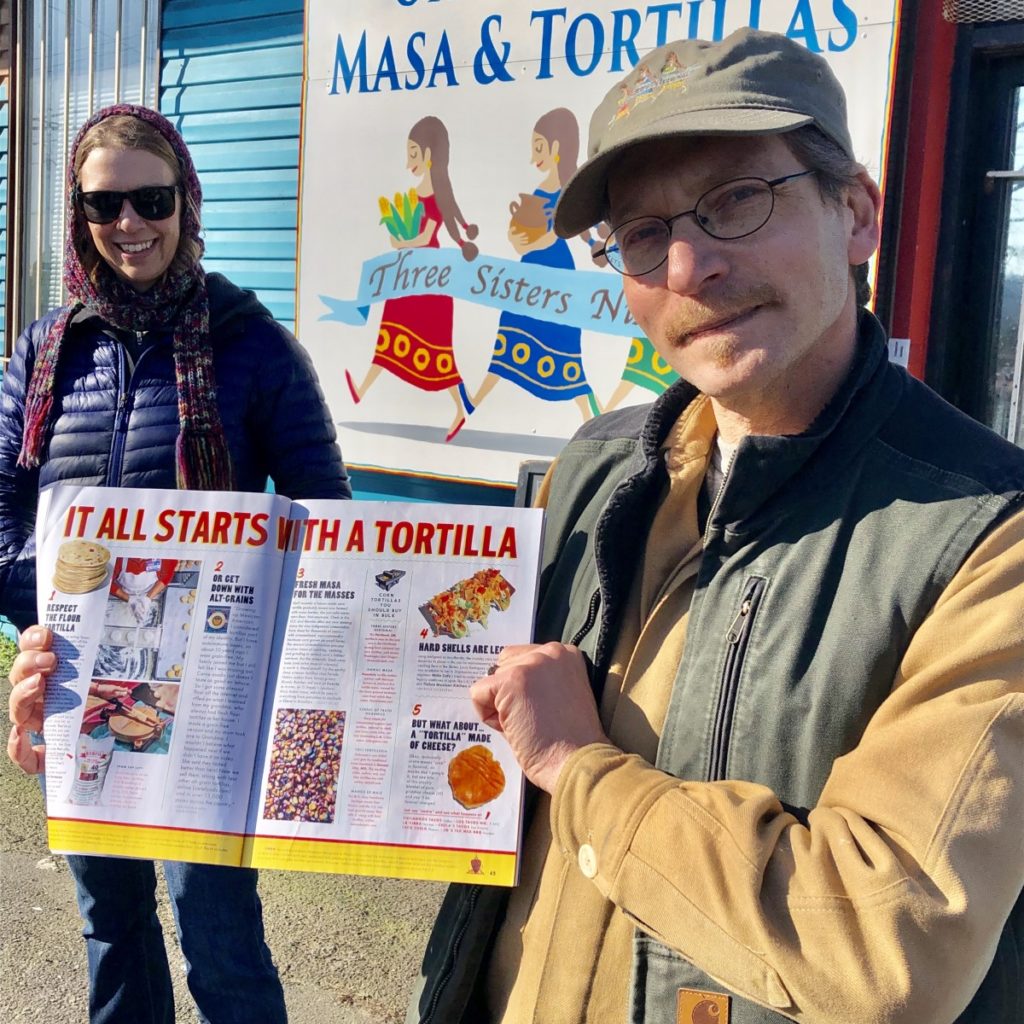
“Most tortillas made today are mass produced, made from industrial ground corn flour with all kinds of additives, which include agricultural glyphosates and carcinogenic preservatives” says co-founder Pedro Ferbel-Azcárate. “This is done to give the product a longer shelf life. But at Three Sisters, we care more about health, taste and nutrition from farm to table.”
“We’re making tortillas the way they’ve been made for thousands of years by the indigenous peoples of the Mexico and Guatemala highlands” comments Pedro. “Our technique is to honor the traditions.”
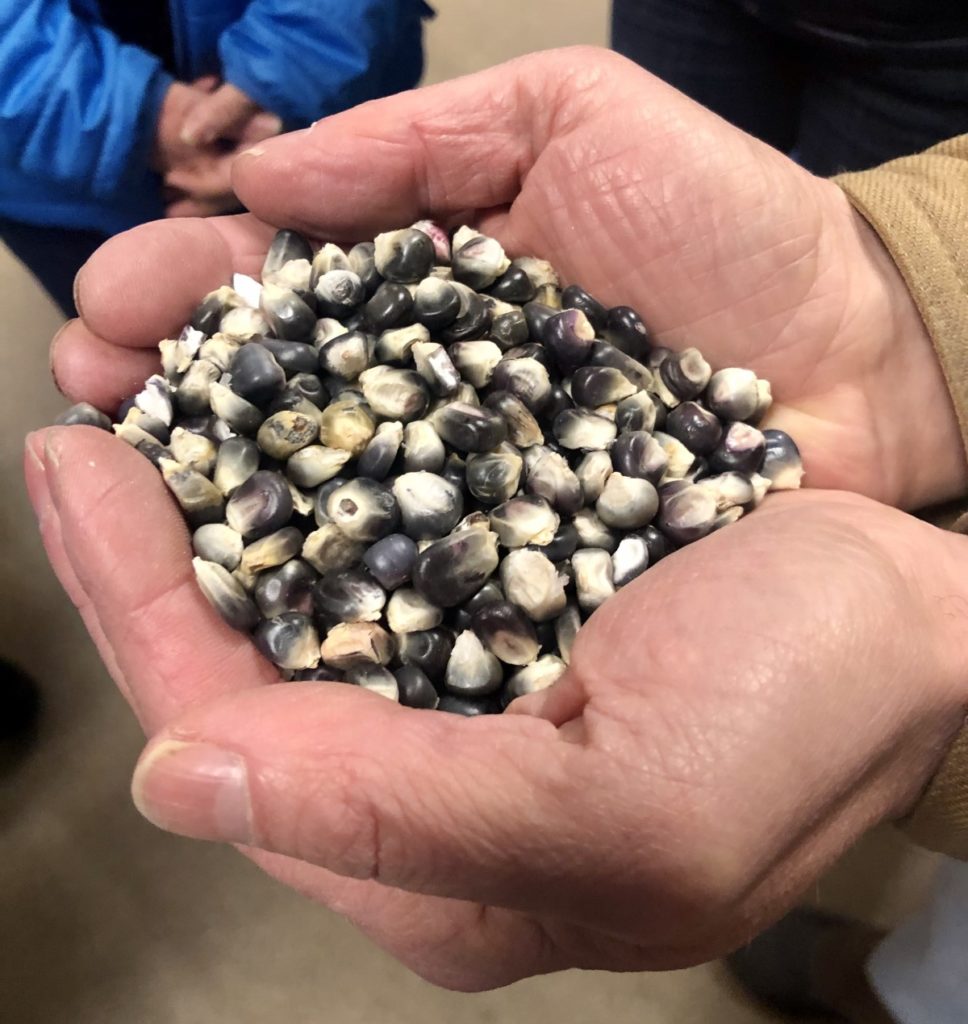
It all starts with the corn…
The organic white, yellow and blue kernels are sourced from small farms and cooperatives in the Chihuahua, Mexico where corn farmers are still growing corn the traditional way. Other varieties, including Red Chalqueno, are grown in Oaxaca and the Estado de México.
Once the raw corn is delivered to Three Sisters, all of the processing of the corn into masa and tortillas takes place at their Portland factory. “Each type of corn gets cooked differently,” says co-founder Adriana Azcárate-Ferbel, “We are constantly adjusting for each batch; the process needs constant monitoring as corn varies by season and where its grown.”
Here is Three Sisters’ six-step process to making their wholesome and tasty tortillas:
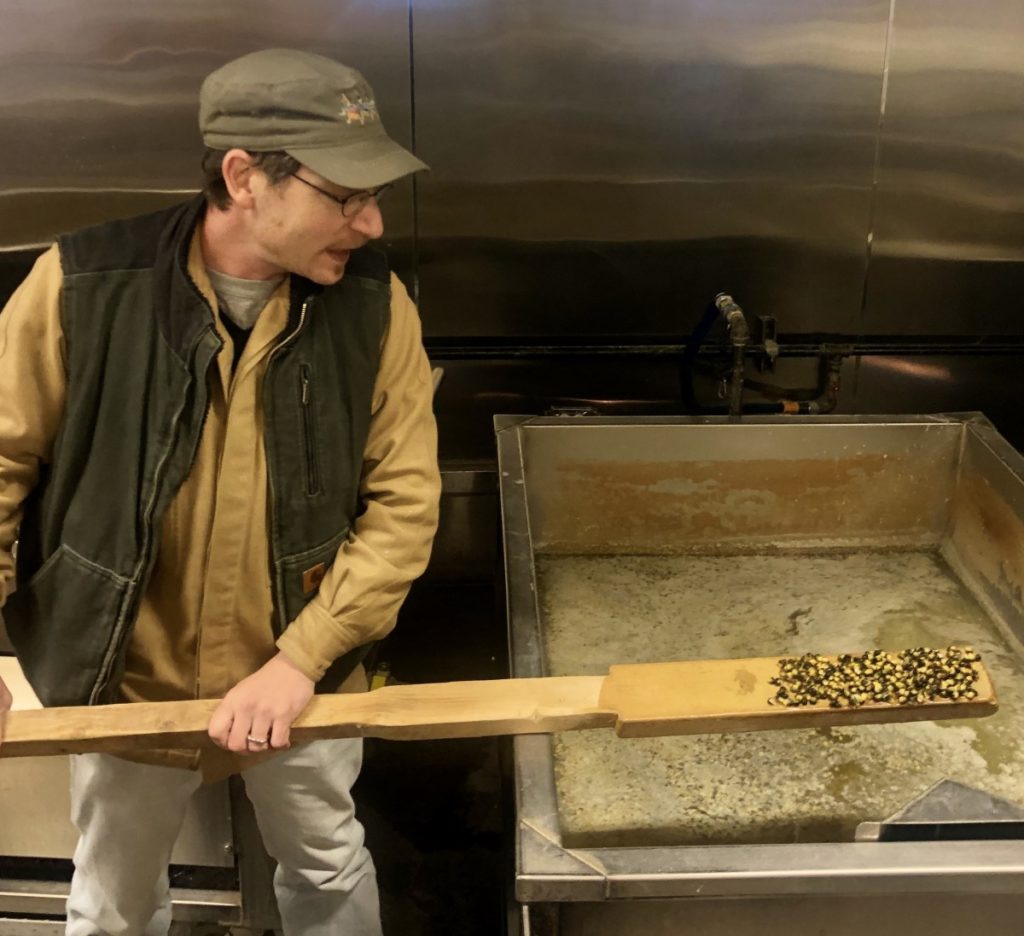
Step One: Nixtamalization / Cooking the Corn
Nixtamalization is the process of soaking raw corn kernels in water with a trace of lime (calcium hydroxide); this softens the corn, and makes it digestible to humans. At Three Sisters it is done in cooking tanks to dissolve the outer seed coating; it usually takes about an hour for the corn to plump up and turn into hominy. “The corn tells us when it’s ready,” says Adriana. “By the smell, sound, taste, and chew.”
Step Two: Grinding /Milling the Corn
The fresh nixtamal hominy goes is ground in a volcanic stone mill – and masa comes out. It’s a wet grind – never a dry powder. That’s fresh masa!
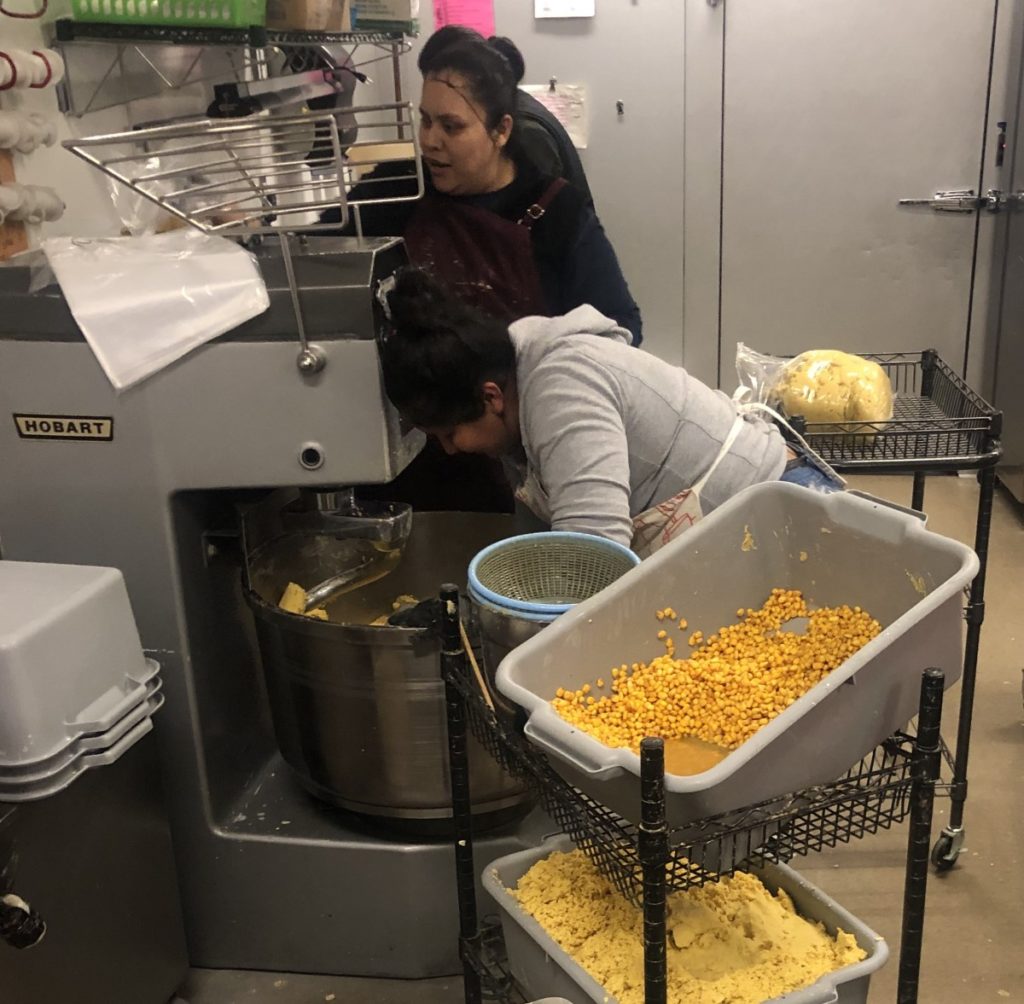
Step Three: Shaping
The masa dough is fed into a sheeter and cut into tortillas, at the head of the tortilla oven.
Step Four: Baking
When you bake a tortilla, you have to flip it twice, notes Pedro. At Three Sisters, specially designed ovens do this automatically, with a gravity-fed design.
Step Five: Catching & Cooling
The tortillas are caught by hand when they come out of the oven, and then put into stacks to cool.
Step Six: Packaging
And finally, the tortillas are packaged under the colorful Three Sisters label, for sales at Portland Farmers Market and distribution to stores and restaurants throughout the region.
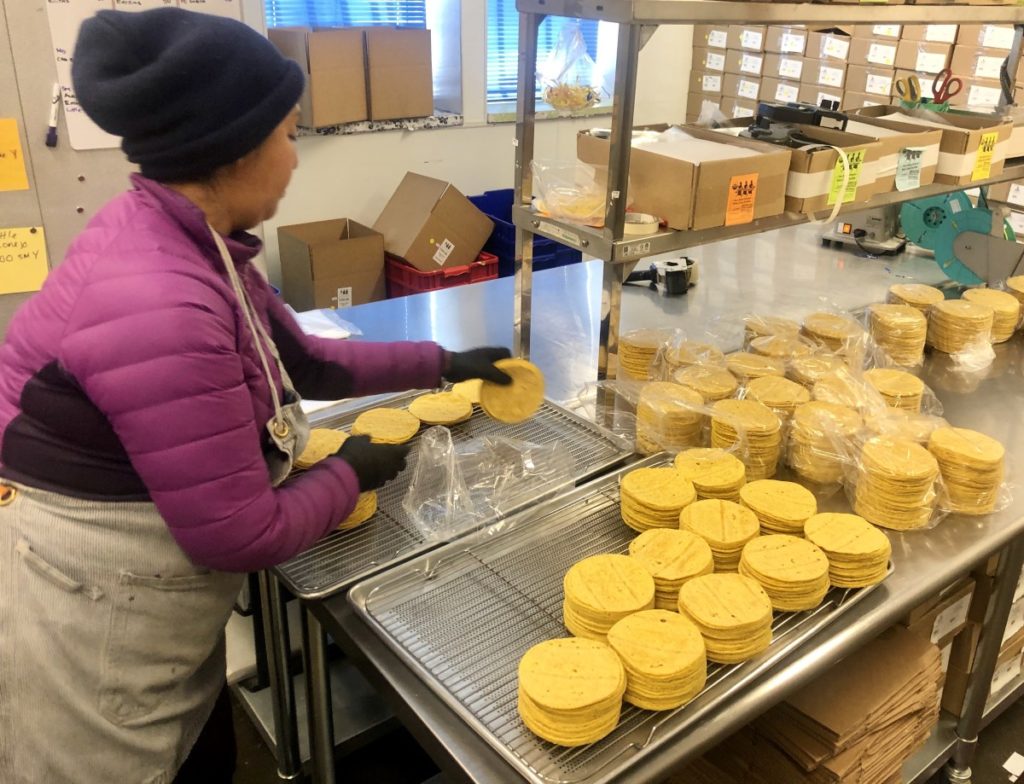
One of the many things that Three Sisters is proud of is the collaborations they’ve developed with other market vendors and local farmers.
For example, the Verde tortilla features spinach, cilantro and jalapeño from Gathering Together Farm, who are now also selling their tortillas at market. Three Sisters is working with Hot Mama Salsa to develop signature Blue Corn Tortilla Chips. They are also trying chiles from Westwind Gardens for their chile tortillas and mixed bags. They will also supply fresh masa for new Portland Farmers Market food vendor, Sara’s Tamales, who uses it in her authentic Oaxacan tamales and sopes.
While there is no Indigenous-style corn grown in the Pacific Northwest, Pedro notes that Three Sisters is working with a Willamette Valley farmer to grow Oaxacan Green Dent corn for their tortillas, which may be available next year.
Portland Farmers Market has been a great testing ground for Three Sisters, according to business partner Wendy Downing. “It provides a great opportunity for us to test new artisan products and get immediate feedback from our customers.”
Three Sisters produces many different shapes, sizes and varieties of masa and tortillas, and certain flavors have only been available at the Portland Farmers Market. “A good portion of our business is sales to restaurants,” says Wendy. “Many chefs discover our products at Portland Farmers Market, and then buy our tortillas and masa in bulk for their restaurants.”
And if you’re wondering about the name, thinking that perhaps the company was founded by three sisters, that’s not the case.
The name – Three Sisters – originates from the traditional agricultural method of growing of maize (corn), beans and squash practiced by indigenous people throughout the Americas — the bean vine grows around the corn stalk fixing the nitrogen to the soil while the squash provides a shady ground cover that locks in moisture and keeps weeds and insects at bay. These three sister crops, grown and eaten together, offer environmental sustainability and nutritional balance, and represent the cornerstone of Three Sister’s values and philosophy.
Three Sisters Nixtamel has returned to PSU Farmers Market on Saturdays! Customers can also pick up tortillas and masa directly at their retail storefront at 7475 SE 72nd Avenue (Tuesdays and Fridays, 10am-1pm) or on the shelves of New Seasons and local food co-ops and specialty markets throughout the city. To learn more about how they have responded to the COVID-19 crisis and how to find their products, click here.
